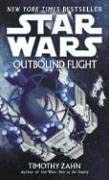 If you read Heir to the Empire right away in 1991 like I did, you may recall Zahn’s earlier novel mentioning the Outbound Flight project: an expedition to the closest galaxy that disappeared without any survivors. It was only important to the plot because the story’s Force-wielding villain, Jedi Master Joruus C’baoth, was allegedly on board. I guess people had been bugging Zahn and/or the people who approve the novels to finally tell the story about what happened. Long ago, I used to be curious then Lucas made those awful three prequels killing my interest in his franchise. Then I received this paperback for free and needed something to read at the airport.
If you read Heir to the Empire right away in 1991 like I did, you may recall Zahn’s earlier novel mentioning the Outbound Flight project: an expedition to the closest galaxy that disappeared without any survivors. It was only important to the plot because the story’s Force-wielding villain, Jedi Master Joruus C’baoth, was allegedly on board. I guess people had been bugging Zahn and/or the people who approve the novels to finally tell the story about what happened. Long ago, I used to be curious then Lucas made those awful three prequels killing my interest in his franchise. Then I received this paperback for free and needed something to read at the airport.
Set five years after the events in The Phantom Menace, a trio of small-time smugglers accidentally miscalculate their hyperspace jump and find themselves far outside the Republic. They’re quickly rescued by alien vessels from the Chiss Ascendency and quickly become prisoners. Leading the Chiss squadron is Commander Mitth’raw’nuruodo, the man who would become Grand Admiral Thrawn, probably Emperor Palpatine’s best commander. He becomes the New Republic’s strategic problem in the Heir trilogy.
Back in the Republic, Supreme Chancellor Palpatine is still plotting his coup through a moronic web of byzantine schemes and double crosses that the even dumber Jedi Council can’t figure out. I suppose the Council isn’t sweating it because things have been relatively peaceful after the Naboo affair. Then a dispute between the miners of Barlok and some corporation erupts. Fearing a repeat of Naboo (and probably another awful movie like Phantom), Palpatine dispatches Jedi Master Jorus C’baoth (yes, the one ‘u’ isn’t a typo) to negotiate a settlement. Why him instead of Yoda or Mace Windu? In the eyes of the Chancellor, he’s the “right” man for the job with nothing better to do; the Senate recently killed the funding for his Outbound Flight project. If he settles the Barlok squabble successfully, Palpatine promises to restore the funding. The Council isn’t pleased since assignments are their jurisdiction and some find C’baoth’s methods heavy handed. Enter Obi-Wan and Anakin to the story. At Windu’s orders, they’re sent to Barlok to assist in the talks but they’re primarily going to make sure C’baoth doesn’t exceed his position; he has authoritarian streak in him.
Eventually, the two dueling story lines converge with semi-predictable results but Obi-Wan and Anakin aren’t around when it happens. They do have to survive so they will appear in two crappy films. As for the fate of the Outbound Flight’s crew, it isn’t as tragic as Heir made it out to be, heck, it may have been a sequel or premise to some novel set after Return of the Jedi.
Zahn’s style of writing flows pretty well. He isn’t a chore to read thankfully. My problem mainly stems from Lucas wrecking Star Wars in 1999. However, just as there’s been a trend to make Darth Vader, Klingons and Richard Nixon into tragic, misunderstood villains, Zahn does the same nonsense with Thrawn. Back in Heir, he’s a brilliant, ruthless and cunning foe who is willing to do whatever it takes to restore the Empire; hence his risky deal with Joruus C’baoth. Here, he’s this well-meaning, practically invincible commander doing what he thinks is best for his race and gets duped by an agent of Palpatine. I have a hard time believing the seeds of his “evil” persona are planted in this. As for Obi-Wan and Anakin, they’re just placeholders since Zahn’s writing is focused on his creations. Obi-Wan is only a Knight, C’baoth easily outranks him which prevents countering any of the tyrannical Master’s edicts. Anakin is unsurprisingly drawn to C’baoth’s ideas of cutting through the bureaucracy and the means-justify-the-ends attitude. Neither really receives any development in this story other than emphasizing the ongoing struggle of Anakin’s disobedience.
Outbound Flight is a competently written piece of fiction and possible Star Wars canon but it will only interest the dwindling number of diehard fans.
